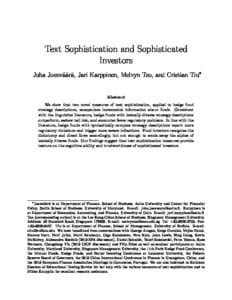Stockholm (HedgeNordic) – Paying close attention to individual words and syntax in a hedge fund’s strategy description can offer useful insights for the hedge fund selection process, according to a new paper. The study shows that hedge funds with lexically diverse strategy descriptions deliver superior risk-adjusted returns, manage risk more carefully, and encounter fewer regulatory problems.
The paper by Juha Joenväärä, Jari Karppinen, Melvyn Teo, and Cristian Tiu finds that two measures of text sophistication from the linguistics literature, namely lexical diversity and syntactic complexity, “encapsulates useful information for hedge fund selection and for understanding the factors underlying alpha generation.” Lexical diversity – the inclination of writers to use multiple synonyms rather than repeated words – has been associated with cognitive ability and honesty. On the other hand, syntactic complexity – the inclination to favour complicated sentences characterized by heavy use of subordination – has been linked to deceptive behaviour.
“It’s somewhat surprising because strategy descriptions aren’t something you expect to be that informative,” Cristian Tiu told Institutional Investor in a phone interview. “They’re written once in the beginning of a fund’s life and the hedge fund could hire a marketing firm to write a description for them.”
According to the study, hedge funds with high lexical diversity outperform funds with low lexical diversity by 3.6 percent per year. Extensive vocabularies were associated with higher returns even after adjusting for other possible sources of outperformance related to writing ability such as a manager’s education. Furthermore, hedge funds with lexically diverse strategy descriptions exhibit “several additional attributes that are attractive to fund investors.”
First, these hedge funds deliver superior Sharpe ratios, information ratios and manipulation-proof performance measures. Second, lexically diverse funds manage risk more “judiciously,” as they “eschew idiosyncratic risk and tail risk.” As a result, they feature lower residual volatilities, maximum monthly losses, and maximum drawdowns. Third, these funds face fewer regulatory actions, encounter fewer civil or criminal problems, and trigger fewer investment violations. Lexical diversity predicts fund quality, according to the paper, with these findings supporting “the view that lexical diversity is associated with cognitive ability and trustworthiness in the hedge fund arena.”
The four authors also find that syntactic complexity is associated with deception at hedge funds. “Funds whose strategy descriptions are syntactically complex experience more regulatory actions, violate more investment rules, and report more severe infractions, than do funds whose strategy descriptions are syntactically simple,” writes the paper. Interestingly, syntactic complexity is positively related to returns and alpha when not controlling for lexical diversity, but “those relations are statistically insignificant and turn negative after controlling for lexical diversity.”
The authors also find that investors allocate more capital to funds with lexically diverse strategy descriptions compared to hedge funds with complex syntax. In conclusion, the results of this study “indicate that the richness of the vocabulary employed by delegated portfolio managers provides an honest cue to investor sophistication. However, the complexity of the sentence structures used is less reliable as a signal of fund quality.”
The complete study can be downloaded below:
Photo by Aaron Burden on Unsplash

